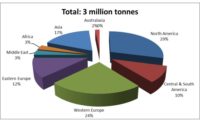Global market for biodegradable plastic expected to soar
A study released by Transparency Market Research (www.transparencymarketresearch.com) predicts that the market for these materials
will be worth nearly $7.8 billion by 2018, almost quadrupling from its current
value of $2.3 billion.
Biodegradable plastics covers both synthetic (petroleum derived) and renewable (bio-based) materials, but the growth will be in the latter as it is considered a more sustainable option.
Although the synthetic plastics market is growing at a steady pace, it lags behind bio-based alternatives and is experiencing a decreasing market share.
The bio-based market is segmented on the basis of its types as starch based plastics, polylactic acid (PLA) and polyhydroxyalkanoates (PHA). This sector alone is expected to reach a value of $7 billion over the next six years.
Major brands such as Coca-Cola are now looking to exploit greater use of plant-based materials for use in packaging - the drink company announced last year it was entering into partnerships with biotech companies to develop commercial solutions for its next-generation of PlantBottle.
Other factors underpinning the growth of such materials are cheap feedstock supply and consumer acceptance. Globally, the main end-markets for biodegradable plastics are in packaging, agriculture and transportation.
Biodegradable plastics covers both synthetic (petroleum derived) and renewable (bio-based) materials, but the growth will be in the latter as it is considered a more sustainable option.
Although the synthetic plastics market is growing at a steady pace, it lags behind bio-based alternatives and is experiencing a decreasing market share.
The bio-based market is segmented on the basis of its types as starch based plastics, polylactic acid (PLA) and polyhydroxyalkanoates (PHA). This sector alone is expected to reach a value of $7 billion over the next six years.
Major brands such as Coca-Cola are now looking to exploit greater use of plant-based materials for use in packaging - the drink company announced last year it was entering into partnerships with biotech companies to develop commercial solutions for its next-generation of PlantBottle.
Other factors underpinning the growth of such materials are cheap feedstock supply and consumer acceptance. Globally, the main end-markets for biodegradable plastics are in packaging, agriculture and transportation.
Looking for a reprint of this article?
From high-res PDFs to custom plaques, order your copy today!




